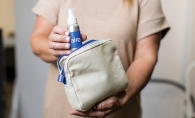The wearable technology industry continues to boom, valued at over $16 billion. While fitness trackers continue to be the standard, we will see more devices aimed at monitoring nutrition. Glucose monitors for nondiabetic individuals analyze in real-time how blood glucose levels respond to certain foods, exercise, stress and sleep.
With orthobiologics, we find the process of using the body’s own cells to repair injuries and reduce inflammation is gaining significant traction within the health care space. It is a noninvasive approach that takes stem cells and platelet-rich plasma from the body to formulate them into higher concentrations where they are injected into the damaged area to illicit faster healing.
The quest for the perfect night of sleep will continue to be a focus. Sleep deprivation is rampant among adults with 35 percent not getting the advised eight hours. Consistent lack of sleep or sleep disorders contribute to chronic disease (diabetes and obesity). The concept of sleep hygiene puts the focus on daily sleep habits. Sleep solutions will be on the rise via apps and wearable technology.
Post pandemic, mental health is front and center with 19 percent of the population living with a mental health condition. Resources are plentiful and easy to access via digital platforms. Several trends include social media boundaries, expansion of telehealth, blood tests to help diagnose mental health conditions and virtual reality to help cope with pain.
Laurel Famigletti is an area resident and owner of EndorP.H.I.T, where she provides virtual group fitness classes, in-home personal training and virtual nutrition coaching.









